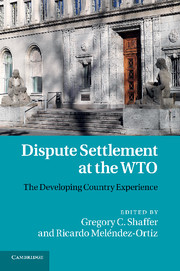Book contents
- Frontmatter
- Contents
- List of tables
- List of figures
- List of contributors
- Preface: The ICTSD dispute settlement project
- Introduction
- Part I Case Studies from South America
- Part II Case Studies from Asia
- Part III Case Studies from Africa
- 7 South Africa's experience with international trade dispute settlement
- 8 WTO dispute settlement for a middle-income developing country: the situation of Egypt
- 9 Sub-Saharan Africa and WTO dispute settlement: the case of Kenya
- 10 Conclusion
- Index
- References
8 - WTO dispute settlement for a middle-income developing country: the situation of Egypt
Published online by Cambridge University Press: 07 September 2011
- Frontmatter
- Contents
- List of tables
- List of figures
- List of contributors
- Preface: The ICTSD dispute settlement project
- Introduction
- Part I Case Studies from South America
- Part II Case Studies from Asia
- Part III Case Studies from Africa
- 7 South Africa's experience with international trade dispute settlement
- 8 WTO dispute settlement for a middle-income developing country: the situation of Egypt
- 9 Sub-Saharan Africa and WTO dispute settlement: the case of Kenya
- 10 Conclusion
- Index
- References
Summary
Introduction
The dispute settlement mechanism of the World Trade Organization (WTO) is often referred to as the ‘Jewel of the Crown’ of the multilateral trading system, and rightly so. The WTO ‘Understanding on Rules and Procedures Governing the Settlement of Disputes’ (DSU) was established to offset the legal and institutional inadequacies of the General Agreement on Tariffs and Trade (GATT). Though it has only existed for ten years, the application of the WTO dispute settlement mechanism has proven to be an efficacious means for handling disputes between WTO Members.
The current state of the WTO suggests that the dispute settlement mechanism is more effective than any other part of the WTO. This judgment is severe, but not without substance. In contrast to the power-based system of the GATT, the DSU as the core of the WTO's rules-based system constitutes one of the most visible achievements of the Uruguay Round. However, this advance does not mean that the DSU has been without problems. Existing scholarship acknowledges that the system's operation remains far from a neutral technocratic process. Larger and wealthier countries are in a much better position to take advantage of the resource-demanding procedures of the legal system. Developing countries will have to become more aware of the implications of the use of the WTO dispute settlement system on their economies and participate more in the process of its evolution.
- Type
- Chapter
- Information
- Dispute Settlement at the WTOThe Developing Country Experience, pp. 275 - 300Publisher: Cambridge University PressPrint publication year: 2010
References
- 1
- Cited by



